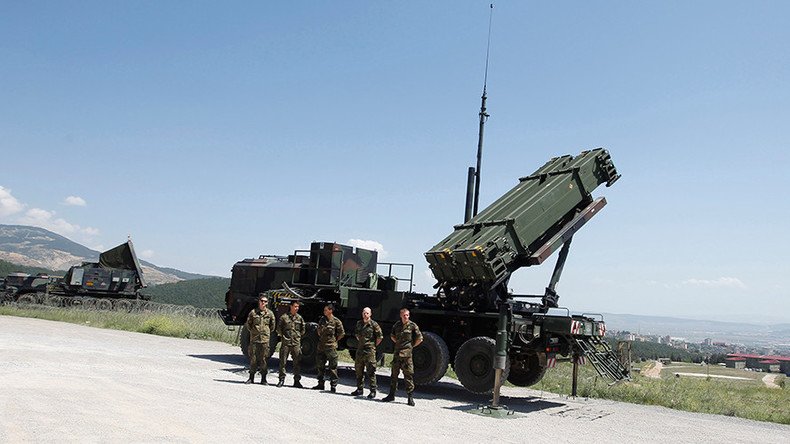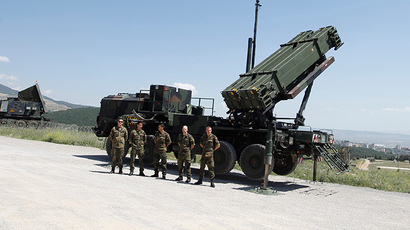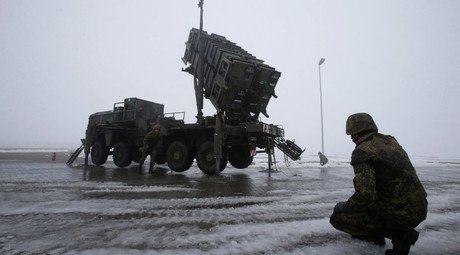Germany withdraws Patriot missile defense systems from Turkey

Germany has removed two Patriot missile air defense complexes and 250 personnel from Turkish territory, news agency Anadolu has reported. Berlin had earlier announced the mission’s mandate would expire in January 2016.
The Patriot complexes were loaded on a Danish ship which left the Turkish port of Iskenderun on Tuesday, bound for Germany.
#Germany withdraws Patriot missile systems from #Turkeyhttps://t.co/59w836qmvcpic.twitter.com/xiWzTFuzUB
— ANADOLU AGENCY (ENG) (@anadoluagency) December 22, 2015Back in January 2013, six NATO Patriot complexes - two units from each of Germany, the Netherlands and the US - were delivered to Turkey to guard the border with Syria, in a move Damascus officials linked with plans to establish a no-fly zone along the Turkish-Syrian border.
In September 2014 the Dutch Patriot systems were replaced with Spanish ones.
In mid-August 2014 the German Defense Ministry announced it was to end its border protection mission in Turkey and remove its missile defense batteries from the country.
READ MORE: Germany to withdraw its anti-air missiles from Turkey
Germany cited a “low ballistic missile threat,” as well as the “high costs of the mission” as reasons for the pullout.
A month before that, however, German media reported the nation’s Patriot air and missile defense systems stationed in Turkey had been carrying out “unexplained” commands allegedly issued by unknown hackers - a message later rebutted by Berlin.
READ MORE: German missile battery receives orders from… unknown ‘hackers’ – report
In October 2015 the US Department of Defense made a statement it would not be renewing its Patriot defense system in Turkey once its mandate expired in October. The air defense missile units were assigned to be shipped back to the US for upgrades.
READ MORE: US to pull Patriot anti-air missiles from Turkey
Although both American and German Patriot missile batteries have now been withdrawn from Turkey, NATO Secretary-General Jens Stoltenberg said last week that Spanish Patriots will stay in Turkey for one more year.
Stoltenberg also said recently that NATO is seeking to deploy more aircraft and command ships to Turkey in order to boost the country's defense capabilities, following the incident with the Russian Su-24 bomber downed by a Turkish F-16 fighter jet in Syrian airspace on November 24.
READ MORE: 9 quick facts about Russian Su-24 jet downed by Turkish Air Force
The British Royal Air Force (RAF) is expected to deploy additional military aircraft to Turkey's Incirlik Air Base in Adana, while German Tornado jets will arrive to Incirlik to conduct exploratory flights. Denmark and Germany are also expected to deploy additional command ships to NATO forces in the Mediterranean.
Danish frigates will be assigned to provide electronic intelligence and “protect” Turkey from Russian S-400 missile air defense complexes recently deployed in Syria at the Russian Khmeimim Air Base in Latakia.
No US airstrikes in Syria since Russia deployed S-400 systems https://t.co/YphdCfKJ0lpic.twitter.com/dALQPCgTL3
— RT (@RT_com) November 28, 2015“This is something we have been working on long before the [Su-24] incident and is separate from the incident,” Stoltenberg told reporters following a NATO foreign ministers meeting in Brussels in mid-December.
“I think the focus now should be on how we can de-escalate, how we can calm tensions and how we can address the need to improve, strengthen mechanisms to avoid [the kind of incident] that we saw [on November 24],” Stoltenberg said following the downing of the Russian Su-24.
On December 16 the US military announced the withdrawal of 12 F-15 fighter jets from Turkey’s Incirlik Air Base, to be relocated back to their permanent base in Britain. The US European Command explained that the deployment of these aircraft to Turkey in November was from the very beginning only planned to be short-term. The Pentagon is expected to replace F-16 interceptors in Turkey with ground attack planes.














